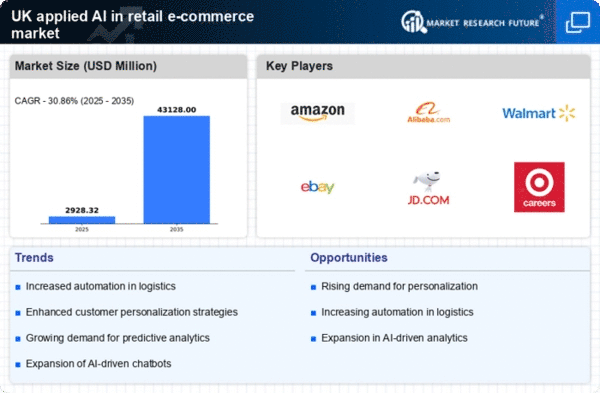Supply Chain Optimization
Supply chain optimization is a critical driver for the applied ai-in-retail-e-commerce market, as retailers seek to enhance efficiency and reduce costs. AI technologies are being employed to forecast demand, manage inventory levels, and streamline logistics. In the UK, the application of AI in supply chain management has been shown to reduce operational costs by up to 15%. This optimization not only minimizes waste but also ensures that products are available when and where they are needed, thus improving customer satisfaction. As retailers increasingly adopt AI-driven solutions, the ability to predict market trends and consumer preferences will likely lead to more agile and responsive supply chains. Consequently, the applied ai-in-retail-e-commerce market is poised for significant growth as businesses recognize the value of AI in enhancing supply chain efficiency.
Data-Driven Decision Making
The applied ai-in-retail-e-commerce market is increasingly influenced by the ability of retailers to leverage data analytics for informed decision-making. Retailers are utilizing AI algorithms to analyze consumer behavior, sales trends, and inventory levels, which enhances operational efficiency. In the UK, it is estimated that 70% of retailers are adopting data-driven strategies to optimize their supply chains and marketing efforts. This shift towards data-centric approaches allows businesses to respond swiftly to market changes, thereby improving customer satisfaction and retention. The integration of AI in data analysis not only streamlines operations but also provides insights that can lead to increased profitability. As the applied ai-in-retail-e-commerce market continues to evolve, the reliance on data-driven decision-making is likely to grow, positioning retailers to better meet consumer demands.
Enhanced Marketing Strategies
The development of enhanced marketing strategies through AI is a notable driver in the applied ai-in-retail-e-commerce market. Retailers are utilizing AI to analyze consumer data and tailor marketing campaigns to specific demographics, resulting in more effective outreach. In the UK, studies indicate that targeted marketing efforts powered by AI can increase conversion rates by as much as 30%. This capability allows retailers to engage customers with personalized content, thereby fostering brand loyalty and driving sales. Furthermore, AI tools enable real-time adjustments to marketing strategies based on consumer responses, ensuring that campaigns remain relevant and impactful. As the applied ai-in-retail-e-commerce market continues to mature, the integration of AI in marketing will likely become a standard practice, enhancing the overall effectiveness of promotional efforts.
Automation of Customer Service
The automation of customer service through AI technologies is a pivotal driver in the applied ai-in-retail-e-commerce market. Chatbots and virtual assistants are being deployed by retailers to enhance customer interactions, providing instant responses to inquiries and support. In the UK, approximately 60% of consumers prefer engaging with AI-driven customer service solutions due to their efficiency and availability. This trend not only reduces operational costs for retailers but also improves the overall customer experience. By automating routine inquiries, businesses can allocate human resources to more complex issues, thereby enhancing service quality. The ongoing advancements in natural language processing and machine learning are expected to further refine these automated systems, making them more intuitive and effective in addressing customer needs within the applied ai-in-retail-e-commerce market.
Fraud Detection and Prevention
Fraud detection and prevention is an essential driver in the applied ai-in-retail-e-commerce market, as retailers face increasing challenges related to online security. AI technologies are being implemented to identify and mitigate fraudulent activities, protecting both businesses and consumers. In the UK, it is estimated that retail fraud costs the industry over £1 billion annually, prompting retailers to invest in AI-driven solutions. These systems analyze transaction patterns and user behavior to detect anomalies that may indicate fraud, allowing for swift intervention. The ongoing development of machine learning algorithms enhances the accuracy of these systems, making them more effective in safeguarding transactions. As concerns over online security grow, the applied ai-in-retail-e-commerce market is likely to see a rise in the adoption of AI technologies aimed at fraud detection and prevention.
















